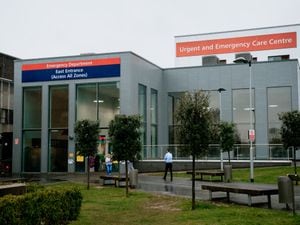Delayed Black Country hospital lockdown 'cost 25 lives' after NHS veto
Up to 25 lives could have been saved by an earlier hospital lockdown in the Black Country – but efforts to implement measures were vetoed by NHS bosses.

New Cross Hospital boss David Loughton said he was “leant on from a big height” to keep doors open to visitors when the pandemic broke.
Instead, restrictions were not put in place until more than a fortnight later.
Mr Loughton CBE, chief executive of the Royal Wolverhampton NHS Trust, said he would “never know for sure” the cost of the delay but estimated it to be “potentially” 25 lives.
Latest rates of infection in the region:
Average number of new cases per 100,000 people for the seven days to July 26.
Figures show rate for seven days to July 26 followed by equivalent figure for the previous seven days to July 19.
Data for the most recent three days (July 27-29) has been excluded as it is incomplete and likely to be revised.
Sandwell 32.4 v 23.2
Wolverhampton 15.3 v 5.0
Birmingham 13.1 v 12.6
Walsall 6.7 v 11.3
South Staffordshire 5.4 v 2.7
Dudley 5.0 v 1.2
Stafford 2.9 v 3.7
Mr Loughton said he would “never know for sure” if the people would have survived if action was taken, but expressed his regret at locking down immediately.
He stressed he and Wolverhampton Council public health chief John Denley had made their points known to the Department of Health and Social Care and Public Health England over the issue.
And he said the pair would be ready to reiterate the point if they are called up for the public inquiry into the Government’s handling of the issue.
More Covid-19 coverage:
He said: “I will remember for the rest of my life Saturday, March 7, at 1pm, getting a phone call and I had to come in and so did my team and so did John Denley. And I don’t think we had got the remotest idea of what we were going to have to face up to. And then it was Sunday, March 8, and here is my biggest personal regret.
“John Denley and I had at I think about 2pm that afternoon, Sunday afternoon, said we should stop all visiting immediately.
"We didn’t do that for another two-and-a-half weeks because I was leant on from a big height not to do it, and I don’t think there was any recognition that for whatever reason the Black Country was just behind London in taking off and getting to the peak.
"And I’ll never know this, will I? But I think there were probably 24 or 25 deaths that may not have happened if we had locked down earlier.
“We’ve made our points known and I’ve got no doubts that if I do get asked to attend the public inquiry, myself and John Denley, we will be making the point that in our professional opinion that we should have closed down two-and-a-half weeks before we did.”

Measures were not imposed at the hospital for two weeks, despite the Black Country being a hotspot for the virus in the initial outbreak in the country.
Mr Loughton: “I was leant on from a big height not to do it. I don’t think there was any recognition that for whatever reason the Black Country was just behind London in getting to the peak.”
The hospital bought hundreds of IPads when the lockdown came to allow patients to speak to loved ones.
Mr Loughton added: “I know it’s been really really hard for people not to be with their loved ones when they’re dying on ITU. I took that decision on March 8 when we realised that to bring people in was a military operation, followed by a deep clean. I do appreciate how difficult it has been.”
The news comes as concerns continue about a rise in virus infections, particularly in Sandwell where a McDonald’s restaurant in Great Bridge has been closed because of a link to cases involving staff members.
Tests are also being carried out in Stone, Staffordshire, after a spike in cases linked to a pub, while the rate of infection has increased four-fold in Dudley but still remains low compared to the rest of the Black Country.





